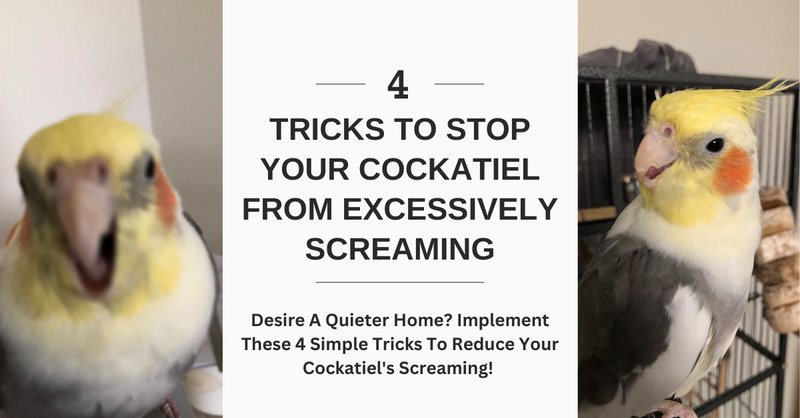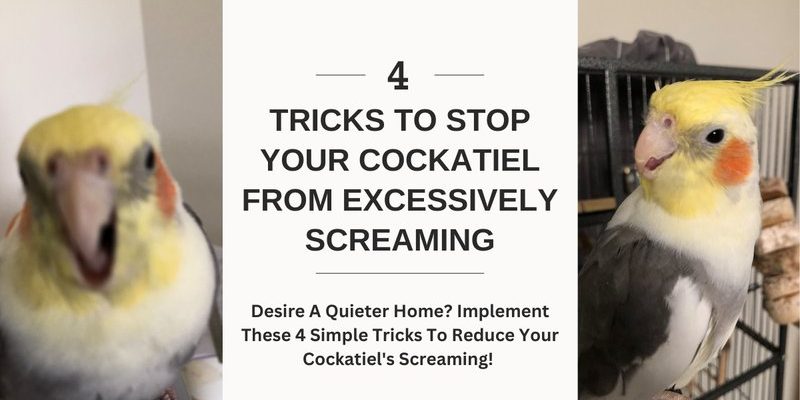
The first thing to keep in mind is that excessive screaming often stems from boredom, loneliness, or the need for attention. Just like humans, birds express their feelings through sound. Therefore, understanding why your cockatiel is chirping away is the first step to solving the issue. Let’s dive into some effective strategies to curb that noise, making your home a more peaceful place for both you and your cockatiel.
Understanding Why Your Cockatiel Screams
Before we talk about solutions, it’s essential to understand the reasons behind the screaming. Cockatiels are social creatures, and they need stimulation! Here are a few common reasons why your feathered friend might be raising the volume:
- Boredom: If your cockatiel spends long hours alone without engagement, it’s likely to scream out of sheer boredom.
- Attention-seeking: Birds often scream to get your attention. If they notice that their screeches lead to interaction, they might continue this behavior.
- Loneliness: As flock animals, cockatiels thrive on social interaction. If they feel isolated, they may call out for companionship.
By identifying these reasons, you can address them effectively. Remember, it’s not just noise; it’s your cockatiel communicating.
Provide Plenty of Mental Stimulation
A bored cockatiel can turn into a squawking machine pretty quickly. To keep those screams at bay, it’s crucial to provide mental stimulation. Think of it like keeping a child entertained with toys and activities. Here are some great ideas to keep your cockatiel busy:
- Toys: Rotate their toys regularly to keep things fresh. Opt for chewable, swinging, or puzzle toys that require problem-solving.
- Interactive Play: Spend time with your cockatiel outside of the cage. Play games like hide and seek, or teach them tricks to keep their minds engaged.
- Foraging Activities: Hide treats in toys or around their cage to encourage foraging. This taps into their natural instincts and keeps them occupied!
By giving your cockatiel activities, you can reduce boredom, and in turn, the screaming.
Establish a Consistent Routine
Just like humans, cockatiels thrive on routine. Having a predictable schedule can make your bird feel secure and reduce anxiety, which may lead to less screaming. Here’s how to create a routine:
- Feeding Times: Feed your cockatiel at the same times every day. This helps them know when to expect food, which can reduce stress.
- Playtime: Set aside specific times for play and socialization. Consistency helps your bird feel more secure.
- Sleep Schedule: Ensure that your cockatiel has a proper sleep schedule. Cover their cage at night to give them a sense of security and help them rest.
When your cockatiel feels secure and knows what to expect, they’ll likely be less vocal.
Socialization Is Key
Your cockatiel is a social creature that craves interaction. If they’re not getting enough social time, they might scream for your attention. Here are some ways to improve socialization:
- Time Outside the Cage: Allow your bird to spend time outside of their cage daily. This helps them feel part of the family.
- Talk to Them: Spend time talking to your cockatiel. They can be great listeners! Whistling or singing to them can also encourage your bird to mimic sounds rather than scream.
- Introduce Other Birds: If possible, consider getting a second bird for companionship. Just be sure to monitor their interactions to ensure they’re getting along.
By being their friend, you’re likely to curb the screaming and create a happier environment for your cockatiel.
Addressing Hormonal Changes
Have you noticed more screaming during certain times of the year? Cockatiels can become more vocal when they’re hormonal, especially during breeding season. Here’s how to address those loud moments:
- Reduce Light Exposure: Limit their daylight hours by covering the cage at night and dimming lights during the day to mimic seasonal changes.
- Avoid Nesting Materials: Remove any items that may encourage breeding behavior, such as nesting boxes. This can help reduce hormonal urges.
- Keep Interactions Minimal: During hormonal periods, limit physical interactions to avoid stimulating them further.
Understanding and managing hormonal behavior can help reduce unnecessary noise during those times.
Use Positive Reinforcement
Instead of punishing your cockatiel for screaming, try using positive reinforcement. This means rewarding them for quieter moments. Here’s how to do it effectively:
- Catch Them Being Good: When your cockatiel is quiet, give them a treat or praise them. This teaches them that being quiet earns rewards.
- Redirect Noise: If they start to scream, redirect their attention with a toy or a treat instead of reacting to the noise.
- Be Patient: Changing behavior takes time. Consistently reinforcing quiet moments will help shape your cockatiel’s habits gradually.
By focusing on positive behavior, you can help your cockatiel learn that being calm is more rewarding than making noise.
Creating a Comfortable Environment
The environment plays a significant role in your cockatiel’s behavior. A comfortable space can lead to a relaxed bird. Here’s how to create an ideal environment:
- Safe Space: Ensure their cage is a safe, welcoming place with perches, toys, and a cozy area for naps.
- Limit Stressors: Identify potential stressors in the environment, such as loud noises or other pets, and minimize them as much as possible.
- Temperature Control: Keep their environment at a comfortable temperature. Cockatiels can become agitated if they’re too hot or cold.
A safe and comfortable home can greatly reduce excessive screaming and encourage a more relaxed demeanor.
With time, patience, and consistent effort, you can significantly reduce your cockatiel’s excessive screaming. Remember, every bird is different, so some strategies might work better than others. Embrace the journey, and enjoy the music your cockatiel has to offer! After all, a little bit of noise is just part of the joy of having such a spirited companion.

